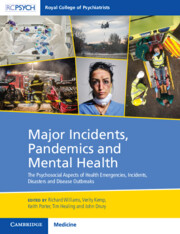 Major Incidents, Pandemics and Mental Health
Major Incidents, Pandemics and Mental Health Book contents
- Major Incidents, Pandemics and Mental Health
- Major Incidents, Pandemics and Mental Health
- Copyright page
- Dedication
- Contents
- Figures
- Tables
- Boxes
- Contributors
- Foreword by Dr Adrian James
- Foreword by Professor David Lockey
- Section 1 The Nature and Impacts of Twenty-First-Century Healthcare Emergencies
- Chapter 1 Emergencies, Incidents, Disasters, Disease Outbreaks, and Mental Health
- Chapter 2 How the World Views Trauma and Trauma Care
- Chapter 3 How the World Views the Mental Health Implications of Traumatic Events, Major Incidents, and Serious Contagious Diseases
- Chapter 4 Two Personal Perspectives on Trauma and Recovery
- Chapter 5 How Emergencies, Incidents, Disasters, and Disease Outbreaks Affect People and Healthcare Practitioners
- Chapter 6 The Impact of Emergencies, Terrorism, and Disease on Children and Their Families
- Chapter 7 The Impacts of Urbanising the World’s Population on Emergencies, Incidents, Disasters, and Disease Outbreaks
- Chapter 8 Myths About Disasters
- Chapter 9 Primary and Secondary Stressors
- Chapter 10 The Differing Challenges Posed by Big Bang, Rising Tide, and Longer-Term Incidents Affecting Local and Dispersed Populations
- Chapter 11 Mental Health in the Context of Multiple Exposures to Disasters
- Chapter 12 The Common Ground in the Mental Health Impacts of Emergencies, Incidents, Disasters, Disease Outbreaks, and Conflict, and a Framework for Responding to People’s Needs
- Section 2 Clinical Aspects of Traumatic Injuries, Epidemics, and Pandemics
- Section 3 The Role of the Public in Emergencies: Survivors, Bystanders, and Volunteers
- Section 4 Responses to Meet the Mental Health Needs of People Affected by Emergencies, Major Incidents, and Pandemics
- Section 5 Sustaining and Caring for Staff During Emergencies
- Section 6 Designing, Leading, and Managing Responses to Emergencies and Pandemics
- Section 7 Key Lessons for the Way Forward
- A Glossary of Selected Key Terms Used in This Book
- Index
- References
Chapter 5 - How Emergencies, Incidents, Disasters, and Disease Outbreaks Affect People and Healthcare Practitioners
from Section 1 - The Nature and Impacts of Twenty-First-Century Healthcare Emergencies
Published online by Cambridge University Press: 11 January 2024
- Major Incidents, Pandemics and Mental Health
- Major Incidents, Pandemics and Mental Health
- Copyright page
- Dedication
- Contents
- Figures
- Tables
- Boxes
- Contributors
- Foreword by Dr Adrian James
- Foreword by Professor David Lockey
- Section 1 The Nature and Impacts of Twenty-First-Century Healthcare Emergencies
- Chapter 1 Emergencies, Incidents, Disasters, Disease Outbreaks, and Mental Health
- Chapter 2 How the World Views Trauma and Trauma Care
- Chapter 3 How the World Views the Mental Health Implications of Traumatic Events, Major Incidents, and Serious Contagious Diseases
- Chapter 4 Two Personal Perspectives on Trauma and Recovery
- Chapter 5 How Emergencies, Incidents, Disasters, and Disease Outbreaks Affect People and Healthcare Practitioners
- Chapter 6 The Impact of Emergencies, Terrorism, and Disease on Children and Their Families
- Chapter 7 The Impacts of Urbanising the World’s Population on Emergencies, Incidents, Disasters, and Disease Outbreaks
- Chapter 8 Myths About Disasters
- Chapter 9 Primary and Secondary Stressors
- Chapter 10 The Differing Challenges Posed by Big Bang, Rising Tide, and Longer-Term Incidents Affecting Local and Dispersed Populations
- Chapter 11 Mental Health in the Context of Multiple Exposures to Disasters
- Chapter 12 The Common Ground in the Mental Health Impacts of Emergencies, Incidents, Disasters, Disease Outbreaks, and Conflict, and a Framework for Responding to People’s Needs
- Section 2 Clinical Aspects of Traumatic Injuries, Epidemics, and Pandemics
- Section 3 The Role of the Public in Emergencies: Survivors, Bystanders, and Volunteers
- Section 4 Responses to Meet the Mental Health Needs of People Affected by Emergencies, Major Incidents, and Pandemics
- Section 5 Sustaining and Caring for Staff During Emergencies
- Section 6 Designing, Leading, and Managing Responses to Emergencies and Pandemics
- Section 7 Key Lessons for the Way Forward
- A Glossary of Selected Key Terms Used in This Book
- Index
- References
Summary
It is usual for humans to experience distress in the aftermath of emergencies, incidents, disasters, and disease outbreaks (EIDD). The manifestation, severity, and duration of the experiences that constitute distress depend on many intrinsic and extrinsic factors. Recent research has demonstrated that distress may be more ubiquitous than was previously thought, and that some interventions, even if well meaning, may not be helpful. Amelioration for most people comes with timely, proportionate, and targeted support and the passage of time. Validation of people’s experiences and minimising the medicalisation of distress are important in helping people to return to ordinary social functioning. This chapter looks at distress related to major events, including the scientific principles, impacts, and implications for intervention. The case study draws on the experience of three members of a pre-hospital team and how a challenging case affected them all.
Keywords
- Type
- Chapter
- Information
- Major Incidents, Pandemics and Mental HealthThe Psychosocial Aspects of Health Emergencies, Incidents, Disasters and Disease Outbreaks, pp. 15 - 22Publisher: Cambridge University PressPrint publication year: 2024


